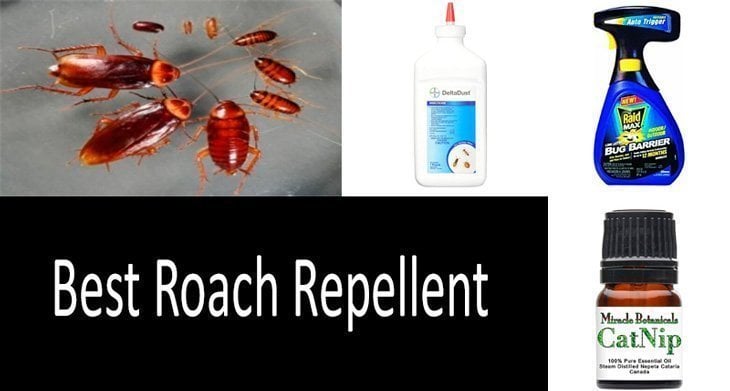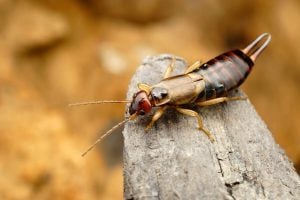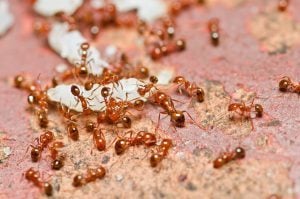I get a lot of people asking me: “Cockroaches can survive a nuclear explosion, what kind of repellents do you mean?” Well, these ancient critters indeed boast a strong immunity (particularly the female ones) and the ability to develop the resistance to insecticides. Then why bother considering repellents, which are a priori less powerful than the solutions designed to kill? In fact, there are reasons to apply repellents and that is where using them makes sense:
- When the trouble is your neighbors. Actually, the wisest way in this situation would be to caulk and seal the crevices and other openings. But sometimes it is impossible to block all entry points for roaches. And this is where repellents do help, as they can make the roaches perceive your house as a wrong environment to settle in.
- When there is a place in your house that can be called “a top protection priority.”Such as the baby’s room, for example. It may happen that you fail to eradicate the cockroach infestation in one go, but there are places in the house where these critters cannot be tolerated at all.
- When you have already got rid of roaches but some of them pop up from time to time. If you do not want to go through the hell of fighting the infestation again, you should also use repellents.
- Prevention is the best way not to see these guys in your house. In this case, repellents will be a good tool in your arsenals. Just apply them regularly, along with cleaning up the house and storing the food properly, and you will stand a pretty good chance of avoiding the roach infestation.
What you will learn from this Guide:
- What is a cockroach repellent?
- What scientists say about roach repellents
- Natural cockroach repellents | Theory and Practice
- Best Roach Repellents and Their Effectiveness
What is a cockroach repellent?
Are there roach repellents? Actually, when referring to roach repellents, I don’t mean specifically labeled products but rather an approach that includes various methods. So the repellent is a substance that discourages the cockroaches from approaching the treated surface or makes them avoid certain areas. There is a number of methods you may try.
- Insecticides designed to kill roaches can repel them as well
- Some fruits and vegetation contain natural ingredients that deter cockroaches
- Cockroach natural predators, like the gecko, not just eat them. Their very presence of their natural predator in the room is a potent repellent for roaches.
- Electronic devices. The manufacturers insist that these devices work but many experts disagree. Why not give it a try, as long as it is absolutely non-toxic.
- Using household cleaners can deter roaches from the treated area.
It is a common mistake for some householders to believe that the repellents can kill insects. It is not true unless the product was designed as both the killer and repellent. An example of such “double-purpose” solution was cited by Michael F. Potter, the extension entomologist at the University of Kentucky. He claims that pesticide foggers are rarely effective in killing household cockroaches because little insecticide penetrates into cracks and voids where these critters usually live. However, foggers can be used as a repellent, “causing insects to scatter and move deeper into wall voids and other hard-to-reach areas”.
I would like to stress another important point. Namely, that the effect of any roach repellent is relative and depends on whether all the necessary conditions are met. What do I mean? For example, if there are piles of unwashed dishes and uncovered food, any efforts to repel cockroaches with any solution — even the most effective one — would be futile.
What scientists say about roach repellents
The main problem with repellents is in misleading the homeowners. When repelling cockroaches instead of killing them, you may just chase them from one room into the other. Worse yet, this may exacerbate the issue: After aerosols are sprayed, roaches avoid those sprayed areas. Using these products can cause the roaches to hide deeper inside walls and be more difficult to control later.This is why it is wrong to apply repellents in an effort to crack the problem of a severe roach infestation. You will not get rid of these pests just by frightening them off. Barb Ogg from the University of Nebraska Cooperative Extension says, “The reasons for the failure of a specific product are not always known. The bottom line is that if you use a product and it does not control the cockroach population like you expected, try something else. It could be that you have a resistant population of cockroaches.”
It is not the only limitation though. If you have set traps and baits, forget about roach repellents! They will make the baits useless since the roaches will not approach and eat the poison. According to Ryan S. Davis with Utah State University, this is particularly the case with pyrethroid-based insecticides that can disrupt the baiting.
It is prevention or integrated approach where scientists admit using roach repellents. Alicia Phillips from Auburn University recommends applying repellents to eliminate cockroach harborages. She also highlights their efficacy in prevention, especially when it comes to equipment, stored food, and other items that can not be treated with chemical insecticides.
A team of researchers at the North Carolina State University have conducted an interesting study. They have simultaneously applied attractants and repellents, with methyl neodecanamide used for the latter. They called it a “push-pull” strategy.
“With the integrated use of attractants and repellents (or stimulants and deterrents), the pest is displaced from a resource that is to be protected, and simultaneously lured to an attractant that can be coupled with a pest control agent,” the researchers have concluded. In doing so, they managed to concentrate the roaches in a limited area, which was then treated with less insecticide.
Natural cockroach repellents | Theory and Practice
When it comes to roach repellents, we, first of all, think about natural ones. Why? Natural ingredients are often included in insect repellents. Half of the insect repellents produced outside the US contained natural oils. However, most of them were not botanical extracts but rather analogs of natural products. Tests conducted by researchers showed that those products could repel up to 94% of the German cockroaches.
Natural cockroach repellents that work
Scientists have been increasingly studying essential oils as an alternative to chemicals. So Alicia Phillips suggests, essential oil as a substitute for chemicals fumigants, such as methyl bromide, because the former are less toxic both to people and the environment. Fumigation, which is actually gases, has an advantage of penetrating deeper than sprays or dusts. Therefore, fumigation is recommended for treating voids and appliances. The main weak point of this method was that is was not safe, something that is not the case with essential oils.
Can essential oils repel cockroaches? The studies confirm that they can. Apart from being natural, essential oils have an advantage in the fact that the roaches will not need to contact the treated area to be repelled. This is because of the strong odor the essential oils emit. Therefore, repellents based on essential oils are suggested for the use when large areas need to be protected. However, scientists stress that it is true only for high concentrations of the substances. So, in order to be effective, extracts from essential oils have to be highly concentrated. The weak point is volatility. Essential oils evaporate within a short time, which is why you will have to reapply the stuff and more than once.
- Corn mint. According to Alicia Philips, corn mint is toxic both to American and German cockroaches, acting as a good repellent. This is because of menthol and menthone contained in it.
- Catnip essential oil. Scientists with Iowa State University have tested the catnip essential oil to find out whether this substance can repel cockroaches. The result shows that the roaches were spending less time in the areas treated with catnip. This solution is recommended for creating barriers making the roaches avoid certain areas like kitchens and nurseries.
Cucumber. According to researchers at Kansas State University, cucumbers can repel roaches but only when crushed.
Natural cockroach repellents that don’t work
However, I would like to warn you against relying on many other solutions you may find on the Web that are called “natural” roach repellents.
- Guava. Katia Spencer has conducted a study with the Department of Biology at ISCA Technologies and has found out that this fruit, on the contrary, has turned out to be a strong attractant for German cockroaches. 71% of the roaches chose the extract of Guava during the testing. So she concluded that the hypothesis that Guava could be a strong roach repellent was proven wrong.
- Bay leaves are claimed to be roach repellent. But no scientific study has proven this statement yet.
- The assumption that coffee grounds can repel cockroaches seems to come out of nowhere. I wonder who came up with this? Scientists with Texas AgriLife Extension Service bothered to check it and revealed that coffee grounds are actually part of the roach diet.
- Garlic is said to work well against roaches. Its powder is suggested to be sprinkled in and around the infested areas because cockroaches are allegedly repelled by the smell. Again, however plausible it may seem, there has been no scientific study confirming this claim.
- It is the same thing with the idea of washing the floor with Citrus or Lemon… Unless it has strong chemical ingredients.
Best Roach Repellents and Their Effectiveness
Effectiveness Scale: 1 being the least, 10 being the most effective.
Roach repellent can be loosely divided in a number of groups. Look at each of them and choose the type of roach repellents you find the most appropriate to your situation.
Natural roach repellents | Effectiveness: 4 out of 10
Their main advantage is that they are not toxic and can be applied in such “sensitive” places as nurseries and the like. When it comes to essential oils, a large area can be protected from the cockroaches because of their strong odor.
- A 100-percent catnip essential oil belongs to the mint family. The product will cost you less than any chemical solution in this guide. This solution is interesting for having versatile fields of application: it calms down humans, stimulates cats and… repels cockroaches. All these properties have been proved scientifically, therefore, there is every reason to believe it. To repel cockroaches, soak cotton balls in the liquid and distribute them evenly in the area where cockroaches have been detected. You will enjoy the odor while roaches will stay away. A good safe and natural option for the cockroach control!
Natural enemies | Effectiveness: 6 out of 10
Cockroaches have a lot of them. These are centipedes, some species of wasps (Ampulex compressa and Dolicurus stantoni), geckos. Although natural enemies cannot significantly reduce the number of cockroaches in the house — so that they will not annoy you anymore — this method has a great potential, an article published by the University of California said. House geckos, the tropical lizard, preys on roaches at night and usually can be observed near porch waiting for insects. A good option is to target roach eggs using parasitoids, some of which can kill up to 80% of unborn roaches. For example, Tetrastichus hagenowii is used in the natural control of roaches.
Chemical repellents | Effectiveness: 10 out of 10
Typically, these are the insecticides designed to kill cockroaches. Some of the both kill and repel these critters, while others can successfully only repel them, despite claims made by the manufacturer. In other words, it is not that hard to keep cockroaches away by means of a solution containing chemical insecticides. Moreover, this is actually a kind of problem with insecticides in the roach control. When solutions with similar ingredients are applied too often, they first develop the resistance in roaches and then starts showing a repelling effect. If you want to apply insecticides as repellents, the best bet for you is those based on pyrethroid.
- Now, look at a roach spray Raid Max Ant & Roach, the active ingredients of which include imiprothrin, deltamethrin as well as petroleum distillates. As I noted earlier, pyrethroid is the most recommended chemical compound for repelling roaches, while deltamethrin is a pyrethroid ester insecticide. Also, deltamethrin products are said to be among the world’s most popular insecticides.
At first sight, the product seems to be the priciest one in the guide, as it costs three times more than the spray below. Notice, however, the number of cans in the pack — you will get six roach sprays. Believe me, when it comes to repelling, the really quantity matters. If you are naive to think that you may go just with one can, you are wrong. You will have to spray a lot.
So what is good about this product? It seems that it would be perfect for hard-to-reach areas because it is a two-way spray. And, moreover, comes with an attached applicator allowing the repellent to penetrate into cracks and other hidden sites where the cockroaches congregate. Apart from killing the roaches, it has a long residual effect — lasting up to six months — and this is where it acts as a repellent. When applying, point it towards the surface until it is wet. Repeat the treatment every six months or more often.
- Another spray Raid Max Bug Barrier with the active ingredient deltamethrin is available in the price range of up to twenty dollars and is claimed to have a longer residual effect than the previous one — up to 12 months. And the manufacturer calls the product “the longest lasting defense” among Raid insecticides. This is important since the longer the effect remains, the longer it repels the cockroaches.
In addition to the product’s longer-lasting residue, it can be used to create an insect barrier. It can be applied not just indoors but also outdoors. Bear in mind that you should not neglect to treat the area outside the house because it is always better to stop your enemy at the doorway before they start climbing up your fortress. As for spraying inside the house, do it carefully as the bottle produces a wide stream and can be messy. When applied, the spray does not stain surfaces, including finished hardwood. However, the treated surfaces are said to remain sticky for some time.
Dusts | Effectiveness: 5 out of 10
Dusts can act as a repellent to roaches only when applied excessively. According to Professor Harry E. Williams at the University of Tennessee, heavy deposits of dusts will repel cockroaches. Keep in mind that dusts, unlike other insecticides, are odorless, which is why they lack the repelling effect. But if you put a thick layer of dusts, this will likely keep these critters away.
- Like in the previous insecticides, the Delta Dust product’s active ingredient is deltamethrin. This item is a bit more expensive than Raid Max Bug Barrier but you get 1 lb of insecticide covering an area of about 2,000 square feet. Remember that you will need an ocean of this stuff since dusts repel cockroaches only when applied in a thick layer. Moreover, the price is quite moderate given that the manufacturer — Bayer — is a famous and established producer on the pest control market. Besides cockroaches, the product is labeled for a vast number of other pests, so you may want to apply it to get rid of other pests as well.
Powders are usually easy to apply but you should better purchase a duster to spread the dust more effectively. Put about 1/4 of the insecticide in the duster and shake it up. Sprinkle the dust inside the cabinets, in the wall corners and other locations where cockroaches frequent.
Ultrasonic devices are advertised by the manufacturers as a safe way to repel cockroaches. It would be fines except the fact that no scientific studies have proved the efficacy of using ultrasonic devices against cockroaches. “The result failed to provide evidence that ultrasonic technology could be used as an effective pest management tool to repel or eliminate the German cockroach,” one of the tests conducted by researchers at Kansas State University concludes.. Effectiveness: 1 out of 10
Light color. Scientists have found out that some colors can deter cockroaches. It was discovered that red light repels the biggest number of cockroaches. Red light is followed by green, white, yellow, and blue. Effectiveness: 6 out of 10
Comparison Table of the Roach Repellent Effectiveness
| Repellent | Advantage | Effectiveness |
| Natural roach repellents | Safe and non-toxic. Repellents based on essential oils can cover large areas. | 4 |
| Insecticides | Very effective. Often used both to kill and repel cockroaches | 10 |
| Natural enemies | Absolutely natural solution. Kill roaches even without being asked to. Often their very presence repels the critters. | 6 |
| Dusts | Can repel when applied excessively | 5 |
| Ultrasonic devices | Even if the device does not work, there is nothing bad for you | 1 |
| Red light | Can be used as an additional protection for certain areas | 6 |
Can Ultrasonic Devices Repel Cockroaches?
Ultrasonic devices are said to repel cockroaches with the use of high-frequency waves. Manufacturers are competing against each other, releasing an increasing number of new models, some of which are plugged into an electrical outlet, some are battery-operated. Their prices range from just a few dollars up to several hundred dollars. And yet, most scientists who have tested repelling properties of ultrasonic devices have agreed that they cannot be used to effectively deter roaches, an article featured by University of Nebraska-Lincoln Extension says. Worse, as far back as forty years ago, the Federal Trade Commission charged a number of producers with false advertising.
What is wrong with ultrasonic devices being used as roach repellents?
Such repellers should disrupt the normal acoustic communication of roaches or just frighten off from the area. When an ultrasonic mode is set, people do not hear the noise, which makes it a comfortable way of keeping cockroaches away. However, numerous scientific studies do not support these arguments. For example, one of the test from The University of Arizona College of Agriculture and Life Sciences included nine ultrasonic repellers targeting the German cockroach. As a result, the same number of roaches entered rooms both with and without the sound turned on.
Comparison Table: the Effectiveness of Roach Repelling vs Other Methods
As you can see from the table below, repellents are the least effective method to control roaches. That is why I advise you not to pin hopes on repelling them but rather employ more radical and effective methods described in our detailed guide: “TOP-14 Best Roach Killers: Poison Baits, Traps, Powders and Spray | The Complete Buyer’s Guide.”
| Method | Advantage | Effectiveness |
| Repelling | Is highly recommended at the stage of prevention. If you do it right, you will be able to get off cheap! | 5 |
| Exclusion | Without doing this, all further efforts to eradicate roaches will be futile. You kill them and new hordes of roaches appear the next day… | 10 |
| Cleaning up the house | Well, this is about the roach-friendly environment. Filth is where they live, breed and, actually, what they eat along with human food. For better result, use detergents. | 9 |
| Reducing food availability | Just store it in the refrigerator or any tightly closed containers. Do not leave unpacked food on the table and use garbage cans with lids. | 9 |
| Killing | The main condition is to do it the right way. To learn all the nuances of killing cockroaches read “TOP-14 Best Roach Killers: Poison Baits, Traps, Powders and Spray | The Complete Buyer’s Guide.” | 10 |
| Trapping | Trapping serves several purposes at once: it captures the roach, kills it and helps you find out where its harborage is located. | 8 |
F.A.Qs on Cockroach Repellents
Which is the roach repellent frequency?
Scientists conducting relative studies from the University of Arizona College of Agriculture and Life Sciences found out that cockroaches did not respond to any of the frequencies. A device with a wide range of ultrasonic sounds was exploited so that many frequencies could be tested.
Are ultrasonic pest repellents safe for humans?
Yes, they are. Most people cannot hear the ultrasonic sound which is above 18,000 Hz while a healthy young person perceives frequencies from 20 to 20,000 Hz. So some people can hear but this is the exception rather than the rule. But these noises can be annoying not harmful.
Are natural repellents safe for humans?
I would rather say they are relatively safe for humans. Highly concentrated repellents can have a very strong impact. So essential oils, if not handled properly, may cause irritation to the skin and eyes, says The National Pesticide Information Center. Particularly this is the case with allergic people. That is why you should wash your hands after the application as well as not to breathe in and taste the substance.
Are natural roach repellents safe for pets?
Many of natural roach repellents are not safe for pets, particularly cats are sensitive to essential oils. This is because it is difficult for cats to metabolize these oils back out of their systems. From my experience, cats may suffer strong allergic reaction — up to developing the facial edema.
Are ultrasonic pest repellents safe for pets?
Dogs and some other mammals can hear ultrasound. However, much depends on the breed. So small dogs are found to have a better high-frequency hearing.
Does diatomaceous earth kill roaches?
Indeed, diatomaceous earth kills roaches by damaging the coating of their bodies and, as a result, dehydrating the roaches. Boric acid is also a good stomach poison.
What repels cockroaches instantly?
In order to repel roaches instantly, apply insecticide sprays and aerosols. This is a fast-acting repellent producing immediate results.
What are cockroaches afraid of?
Cockroaches are afraid of the light, low temperatures, liquid chemicals and a number of substances that are extracted from naturals plants such as catnip.
Can roach spray make you sick?
A roach spray can be harmful in case you do not handle it in a proper way. Namely, make sure the liquid does not contact with your eyes and skin. Nor should you inhale the repellent. Read the product label and follow it.
Can roach spray hurt my cat?
Insecticides are toxic to everyone, therefore, make sure that your cat does not ingest or inhale the substance. More details about the product’s toxicity to pets is usually provided on the label of each specific product.
Can roach repellent spray affect pregnancy?
During pregnancy, the brain of the baby, as well as its nervous system, are more sensitive to the toxic effects of insecticides. Therefore, you should reduce to a minimum the pregnant woman’s exposure to the insecticides. The risk depends on how toxic the product’s ingredients are, which can be learned from the label on the roach spray.
What causes roaches in a clean house?
Roaches find your home attractive if there is an access to the food, warm places that could serve as a good harborage, old furniture, and if your house obviously requires repair. Also, if your neighbors have driven the roaches out of their house, there is every chance that you see these critters in the house.
How long does it take to repel roaches?
It depends on the level of roach infestation but, actually, you should apply repellents on a regular basis.
How to repel roaches from electronics?
Apply roach sprays, either chemical or natural ones. But be sure you do not spray inside the electronics. Treat the area around the equipment.
Why are roaches attracted to electronics?
Any electronic device generates the heat, which is a welcoming environment for cockroaches. Moreover, most electronics normally have narrow openings, inside of which roaches feel safe and enjoy staying in the dark.
{code 423}
{code 161}
{youtube https://youtu.be/fwCAkoA5Twg}





